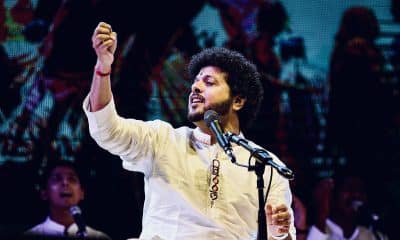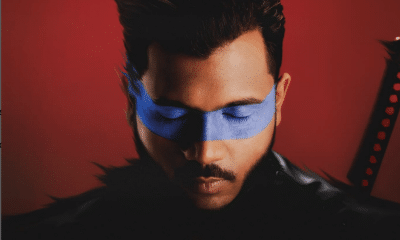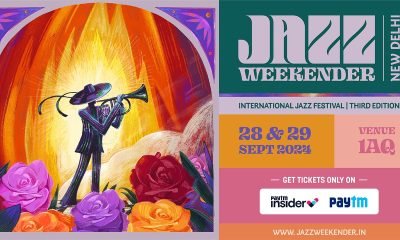Music Is My Path To Salvation: Susmit Sen
Susmit Sen does not really need an introduction. An erstwhile member of one of India’s most popular indie bands Indian Ocean and the man behind the unique guitar tones, Sen started yet another musical journey with his band Susmit Sen Chronicles in 2012.
We caught up with the man with the magical guitar to talk about music, collaborations, young talent and starting all over again.
Tell us a little bit about the inception of Susmit Sen Chronicles. How did the idea come to you, and how did you seek to be different from what you were doing earlier?
Susmit Sen: Well one at a time, Susmit Sen Chronicles started after I came out with my first solo album without Indian Ocean called ‘Depths of the Ocean’. After that, people wanted to hear us live and that is when I decided to form the band and found these young, energetic, extremely talented people. We started performing sometime around August or July last year.
Taking the question to its second part, in terms of the music and the musicality of SSC, how would you want to differentiate yourself from the music you were making earlier?
Susmit Sen: It’s not a conscious effort to differentiate myself, it is a matter of…you know when you spend twenty-three years after forming the band, you need to move on and not be stuck with one particular ensemble. So, I just needed to move on and explore my expressions through a newer band and completely new compositions and see how it goes. So that’s exactly what it is, these are all absolutely new compositions, each sounds completely different from the other, so it’s another expression with completely new people playing along with that.
The signature Susmit Sen guitar tone is something people relate to when you talk of the album release. How is the feedback you’ve received regarding the album?
Susmit Sen: The album received fantastic feedback actually. I mean I was surprised to see the kind of coverage the album got and each one of them talking superlatively about the album. Apart from that, when I’m performing, my guitar tone and my style of playing remains the same. I cannot run away from myself and why should I? If I have been able to create a new sound in playing the guitar then I should stick with it, only thing that the compositions will change and that is where the main expression lies. Yes the basic tonality of the guitar will remain the same.
We saw a lot of collaborations on the album. We had Papon singing a song, and we had Nitin Malik do something as well, so in terms of collaboration, is that something you look forward to even with SSC now? Would you want to collaborate with a lot of vocalists and be a part of the live performances?
Susmit Sen: Well, we have our own vocalist in the band but I am open to collaborating with different people. However, the collaborations will not depend on the fact that these people want to collaborate, they will depend on what the composition actually requires. So, when a composition requires a kind of singing or playing or some other instrument then according to the composition I would request other people to come in different stages if required.
You played with the Indian Ocean for 23 years, and now you are starting with something new. Even as someone who has been a part of the industry for as long as you, does it feel like you are starting from scratch?
Susmit Sen: Yes and no, the overall journey of composing new numbers, practicing it with all the musicians and so on, that definitely did start from scratch. But the fact is that initially, when I started Indian Ocean, nobody even knew about us, so nobody wanted to talk to us, whether it was the TV channels, media or the music companies. However, this time just because they know about me and I also think that’s the advantage you have with age…people do speak to you. So the avenues are not as tightly closed as they were when I started Indian Ocean, definitely not.
Talking about the limited avenues. How have you seen the Delhi scene change over the years, from your early days with the Indian Ocean to when SSC started its journey?
Susmit Sen: Well, the Delhi scene has changed in many different ways. It has changed not just in Delhi but all over the country. When I started Indian Ocean, no one was playing their own music. Now you see lots and lots of bands that are doing their own music, which is such a heartening thing to see. The avenues to perform have also increased in a major way in many ways, which has made it easier, and the internet has brought a sea-change in not just music but the basic way that people are living. It is much easier for a musician or a band to get across to many more people because it is completely free to do that.
Indian Ocean stressed on original music right from the beginning and that’s what you played throughout your career, but has the audience also evolved in terms of accepting original music?
Susmit Sen: Ok, let me put it like this: when Indian Ocean started playing, it was difficult to get shows because the avenues were not there, but whenever we played, it was accepted beautifully. So I don’t think that the quality of the audience has changed. It is the way one can reach them which has become much more manageable. If I were to say today’s audience is better I will be disregarding the audiences which started listening to us in our initial days which I cannot do because they were a huge support for us.
And in terms of SSC like you said last year was when you started playing, what was the initial reaction to this new act that Susmit Sen had begun: the solo album and leading upto the fact that you did separate from Indian Ocean.
Susmit Sen: I did not separate from the Indian Ocean when I did Depths Of the Ocean. There has been a mixed reaction. There are people who have written, especially on FB, because that is the social forum where people write, a lot of tweeting happened, and some were disappointed, and some were looking forward to it. If you ask me, I think people should be looking forward to it because you still have the Indian Ocean with a brilliant young guitar player called Nikhil Rao continuing with the Indian Ocean, and you have another band giving you new music, which is SSC. I think they should be happier at this point of time rather than just see the departure. I will still be performing. I am not going to shut myself off and, you know, not produce more music, and they will probably be getting double the pleasure.
And as a musician, you have seen it all. You have been through the struggle and the success. So, what motivates you now? What do you look forward to?
Susmit Sen: Music, music self–expression that is never going to end till the time I die. Self-expression, new compositions, reaching out to newer people and so on and so forth. Each aspect of it is going to be extremely interesting for me to see, and the other thing is that when the Indian Ocean started, our shows used to be called concerts of conversion because we used to convert people into our audiences. People who would start following us, and if I can go through that process once again, I would be really happy. There are lots of other things I am interested in. Right now, I am producing Harpreet’s album. He is a young boy, just 26 years old and a prolific songwriter and singer and that is the reason why I am producing his album. There are certain other projects that I am getting into which may probably lead me to collaborate with a lot of musicians, not just the popular ones but musicians from the grassroots, folk musicians and so on and so forth. So I am looking forward to all kinds of avenues, the main focus being SSC, but yes, producing albums.
On a personal note, as a musician, when you compose something, where do you get your inspiration from? Is it from what’s happening around you, or is it a moment of creativity?
Susmit Sen: I would say different numbers, different inspirations for sure. It would be difficult to pinpoint those inspirations when you’ve lived for such a long time. There are so many things you’ve experienced in life, which is not just music, and I think experiencing things other than music is extremely important for any artist because, ultimately, you are expressing to the masses who don’t produce the music. So you have to feel your surroundings, and therefore, your expression has to be such that it gets across to people that they understand and feel it.
If you could give us a little insight into your creative process, how do you go about writing and composing for the people who would want to know?
Susmit Sen: At this point, with Chronicles, these are compositions that come as an entirety to me from within me. Then, I sit down with the rest of the band and see exactly who is playing what. I have certain ideas, and they come up with some, and slowly, I would like this to change so that this becomes a workshop like we used to have in the Indian Ocean.
You spoke about producing Harpreet’s music and wanting to work with artists who are worth their salt.
Susmit Sen: I hope to do so, but only if I feel for a particular artist and his or her composition.
Even as a senior musician, you are very approachable. What are some of the questions you get from budding singers, songwriters, musicians, or somebody like Harpreet who is still growing?
Susmit Sen: Everybody is a separate individual and everybody has different kinds of questions but as far as Harpreet is concerned, I think my experience in music to be able to create a particular sound for yourself is something which I have tried to give to his album so that he continues with that particular sound because that artist entity is extremely important. You know the self-identification through their artform. That is what I have tried to do and I hope I have been successful to arrange the music. You know… what does the bass play, what are the instruments that are coming into each song, how it should be, what kind of expression should come out of the voice, suggest some changes here. But if I ever produce again just like what I have done with Harpreet I have never indulged in changing his own expressions and have tried to keep his own compositions intact as much as possible.
You speak of expressing through music. There are certain emotions which are very strong. For you music is a definite expression of your emotions, would that be a correct definition?
Susmit Sen: Absolutely.
And if we were to describe to a layman what SSC is about?
Susmit Sen: This is a question I had a tough time with Indian Ocean also. I do not believe in genres and I will also say that people who do kind of limit themselves. The way I would explain it to them is to make them listen to the music, because nothing better could explain what my music is all about. I have been talking about this throughout my life then why should i play it; you know…I will just explain my emotions to people. But there are certain aspects of human emotion which cannot be expressed through words, through language…through oral language ̶ music is another language.
Going forward from here we wouldn’t call it a “goal” but where would you like to see SSC?
Susmit Sen: The first step is that I would like the album ready by this year. By September-October, I really want to finish it, and I am looking for avenues on how to reach out to people because that is very important. If you can reach out to people then you have done your bit, after that whether people like it or not I will leave it to them. For me, it is important to express myself. Now, how it comes across to people is something which we might have to spend a lot of time thinking about, and whether they like it or not is anybody’s guess.
After years of playing at the highest level, how does it feel to get together with this talented bunch of young musicians?
Susmit Sen: I am loving this experience! They come with their own thought processes and their own analysis of what my music is all about. I often ask them to forget everything that they have learnt and just sit down with the simplest beat pattern. Practice for 3–4 hrs everyday and not move away from that, do not be impatient in music. You know there has to be pace, there has to be poise. So, this process of interaction is extremely beautiful for me.
For me, the slowness of being is extremely important. You know you have to slow yourself down. In this fast pace of today’s world, people miss out on the fineness and nitty-gritty of life. You have to slow yourself down and to be able to manage to do that with youngsters is a completely different experience for me. You cannot possibly be proud of being in twenty places at the same time; you have to concentrate on one thing, and then only you can go into the depths of your expression.
And you speak about practicing relentlessly, even though you are the master of your art do you think practicing is something you religiously follow?
Susmit Sen: Absolutely, I religiously follow a practice, not just because I want to fine-tune to make anything I play with the band as perfect as possible, but also because I have never learnt music. So each time I compose a new piece I have to re-invent myself in playing the guitar because each composition asks for a different kind of playing. If I were playing under a maestro and my fingers would move automatically the way I wanted them to, then probably practising this much would not be needed. I have to reinvent myself because this needs practice to master as much as possible.
So, when you speak of reinvention, we see many improvisations on stage during rehearsals. Is improvisation a way where you keep discovering various facets of your playing?
Susmit Sen: Improvisation has to happen once a particular number gets fixed, even in the pop genre where there aren’t many improvisations on stage. The basic tune is when you fix it…you have already reached a particular stage where you say fine, I am going to fix it out here. So improvisation is the most important thing in creating something.
Finally, one last question for Susmit Sen, the musician: how would you define music? What is music for you?
Susmit Sen: I would say meditation, salvation. That is what music means to me.












































